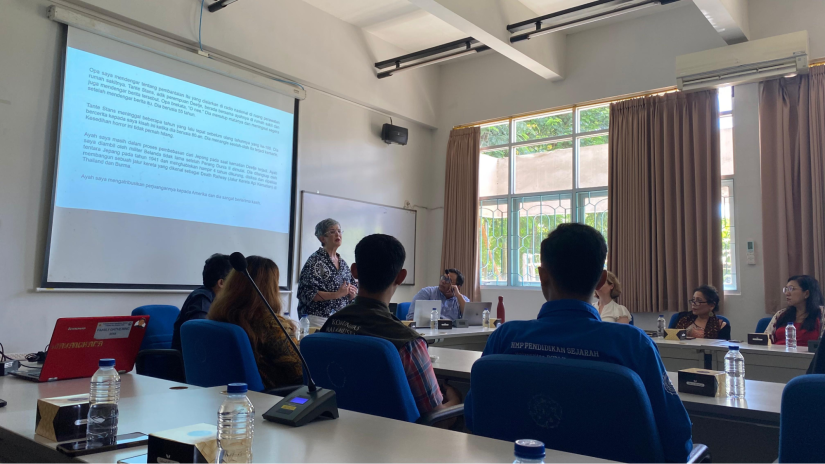
SDGs 16: Peace, Justice, and Strong Institutions
Yogyakarta, Monday, February 19th, 2024 (UGM) – The Malam Museum Community, in collaboration with See Jane Run Team and the Department of History at the Faculty of Cultural Sciences, Universitas Gadjah Mada, successfully organized a historical discussion titled “Where is Home? Stories of Indonesian after World War II by Jane Vogel Mantiri.” The event took place from 09:00 to 11:30 AM in Meeting Room 1 of Poerbatjaraka Building, Faculty of Cultural Sciences, UGM. Dr. Wildan Sena Utama served as the moderator, with Jean Vogel Mantiri and Tedy Hernawan, S.S., M.A., as the speakers. In addition to UGM students, the event was attended by members of the general public and students from other universities around UGM.
Jane Vogel Mantiri shared her life story, particularly the history of her family as descendants of Indo (mixed Dutch and Native) heritage. Genealogical studies revealed that Jane’s Dutch ancestors arrived in Indonesia in the 18th century. Jane herself was born in Jakarta, eight years after the end of World War II. For hundreds of years since the arrival of her ancestors, Jane’s family grew and settled in Indonesia. However, during the erosion of colonial heritage in the decolonization period (1950s to 1960s), Jane and her family faced bitter realities and had to leave Indonesia.
One of the bitter stories that will always be remembered by Jane is about her beloved father’s sister, Deetje. In late October 1945, Deetje was on a train journey after visiting her father, Jane’s grandfather, who was ill due to malnutrition after being detained by the Japanese army. The train was stopped by “Indonesian rebels,” and Deetje was raped, and her head was severed. Her body has never been found to this day. The trauma of Deetje’s death continues to haunt Jane’s family, especially her father. Eventually, Jane’s family left Indonesia in September 1954 and moved to the Netherlands. Unfortunately, their arrival in the Netherlands was not met with open arms due to their non-European complexion. In 1960, Jane’s family migrated to America through sponsorship from a church. There, they obtained American citizenship.
For years, Jane grew up with a sense of shame as a foreigner in America without a country she could call “home.” The turning point that led Jane to rediscover her identity as an Indo descendant was the death of both her parents. Moreover, Jane is convinced that if the tragic events that happened to Deetje had not occurred, her parents would not have been willing to leave Indonesia and accept Dutch citizenship. After all, their daily meals consisted of rice, vegetables, and sambal. Therefore, for Jane, family is not always about lineage but can also be defined by culture.
To this day, Jane admits to still being traumatized by the events that befell her family in the past. She states that there is no cure for trauma. However, someone who is now a trauma psychologist turns that trauma into a reason to strengthen herself. She proves this by revisiting Indonesia and sharing her family’s story in a book. The question “Where is home?” for Jane is finally answered. For her, America is her adopted home. Meanwhile, Indonesia, as the motherland, will always be her homeland.
“When talking about the experiences of Indo people and how they are outsiders, instead of insiders, and also those who are uncategorized or cannot be categorized, it’s quite complex from that perspective because, in my opinion, stories like Bu Jane’s open up new discussions, new spaces where suffering or how Bu Jane feels in peeling off her own identity, and also she doesn’t feel belonging in just one community but can be defined in various or multi-identities,” said Tamim, a History student from the class of 2021.
Wildan Sena Utama stated that racial discrimination was indeed a global issue in the 20th century. He added that the Indo group is marginalized and forgotten. In the Indonesian context, according to Tedy Hernawan, the change in the concept of “Indonesianness” between the pre-20th century and the 20th century also influenced the changing views on the Indo group. Discussions about the Indo group certainly contribute to new discourses related to marginalized groups because not all mixed Dutch-Native descendants live in luxury.

